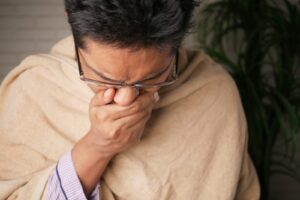Sneezing is a reflex action of our body where air is expelled forcefully through our nose and mouth. Sneezing can happen anytime and anywhere, and it’s a common occurrence. However, in some cultures, sneezing has a deeper meaning than just a physical reflex. Some people believe that sneezing at night has spiritual significance. In this article, we will explore the spiritual meaning of sneezing at night and other beliefs associated with sneezing.
What is sneezing?
Sneezing is a reflex action of our body that occurs when the mucous membranes in our nose and throat are irritated. When something irritates these membranes, our brain sends a signal to our respiratory muscles, which causes us to exhale air forcefully through our nose and mouth. Sneezing is usually accompanied by a sudden contraction of our diaphragm, which is the muscle that separates our chest from our abdomen.
The spiritual meaning of sneezing at night
In many cultures, sneezing is considered a sign of good luck or bad luck, depending on when and where it happens. For instance, in some cultures, sneezing between noon and midnight is considered a good omen, while sneezing at night is thought to be a sign of bad luck or a warning of an impending illness or death. However, the spiritual meaning of sneezing at night varies depending on the cultural beliefs.
The cultural significance of sneezing
In addition to the spiritual meaning of sneezing, there are other cultural beliefs associated with this reflex action. For instance, some people believe that saying “bless you” or “gesundheit” after someone sneezes will protect them from evil spirits or prevent them from getting sick. In some cultures, it’s also considered rude not to say “bless you” after someone sneezes.
Why do we sneeze more at night?
According to experts, there are several reasons why we sneeze more at night. For one, our nasal passages tend to dry out at night, which can make them more vulnerable to irritants such as dust, pollen, and pet dander. Also, during the day, the warm temperatures push the pollen and other allergens up into the air, but at night, when the air cools, these allergens fall back down, causing more irritation and triggering more sneezes.
The connection between sneezing and allergies
Sneezing is a common symptom of allergies, which occur when our immune system overreacts to certain substances such as pollen, dust, mold, or pet dander. When we inhale these allergens, our body releases histamine, which triggers the sneezing reflex. If you suffer from seasonal allergies, you may notice that you sneeze more at night, especially during the peak allergy season.
Tips to reduce sneezing at night
If you’re experiencing sneezing at night, there are several things you can do to reduce your symptoms. First, try to keep your bedroom clean and dust-free, especially if you’re allergic to dust mites. You can also use a HEPA filter to purify the air in your bedroom. Second, avoid using fans or opening windows at night, as this can let in pollen and other allergens. Third, try to keep your pets out of your bedroom, as their dander can trigger allergies. Finally, try to shower before going to bed, as this can wash away any allergens that may be on your skin or hair.
Home remedies for sneezing
There are several home remedies that you can try to reduce your sneezing symptoms. One of the most effective remedies is to drink plenty of water, as this can help to flush out any irritants in your system. You can also try using a saline nasal spray to moisten your nasal passages and reduce inflammation. Another effective remedy is to inhale steam, which can help to loosen mucus and reduce congestion.
When to see a doctor for sneezing
In most cases, sneezing is not a serious medical condition, and it can be easily managed with home remedies. However, if your sneezing is persistent and accompanied by other symptoms such as a fever, cough, or sore throat, you should see a doctor. These symptoms may indicate an underlying infection or allergy that requires medical attention.
Conclusion
Sneezing is a common reflex action that occurs when our nasal passages are irritated. In many cultures, sneezing has spiritual or cultural significance, and it is believed to be a sign of good luck or bad luck depending on the circumstances. Sneezing at night is often associated with allergies and irritants, and it can be managed with home remedies and lifestyle changes.
FAQs
- Is sneezing at night a sign of bad luck?
- In some cultures, sneezing at night is considered a sign of bad luck or a warning of an impending illness or death.
- Why do we say “bless you” after someone sneezes?
- Saying “bless you” after someone sneezes is a cultural belief that is thought to protect them from evil spirits or prevent them from getting sick.
- How can I reduce my sneezing at night?
- You can reduce your sneezing at night by keeping your bedroom clean and dust-free, avoiding fans or open windows, keeping your pets out of your bedroom, and showering before bed.
- Can sneezing be a sign of an underlying medical condition?
- In some cases, persistent sneezing may be a sign of an underlying infection or allergy that requires medical attention.
- What are some home remedies for sneezing?
- Home remedies for sneezing include drinking plenty of water, using a saline nasal spray, and inhaling steam.
- Can allergies cause sneezing at night?
- Yes, allergies can cause sneezing at night. Pollen and other allergens can fall back down to the ground at night when the air cools, which can cause more irritation and trigger more sneezes.
- Is sneezing a symptom of COVID-19?
- Yes, sneezing can be a symptom of COVID-19, but it’s not as common as other symptoms such as fever, cough, and loss of taste or smell.
- Can medication help with sneezing at night?
- Yes, over-the-counter antihistamines and decongestants can help to reduce sneezing and other allergy symptoms. However, it’s important to talk to your doctor or pharmacist before taking any medication.
- What are some common allergens that can cause sneezing?
- Some common allergens that can cause sneezing include pollen, dust mites, mold, pet dander, and certain foods.
- How can I prevent sneezing at night due to allergies?
- You can prevent sneezing at night due to allergies by identifying and avoiding your triggers, keeping your bedroom clean and allergen-free, and taking medication as prescribed by your doctor.

